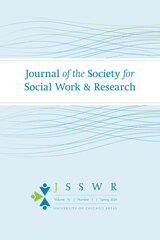136 scholarly books by Dartmouth College Press and 13
have author last names that start with S
136 scholarly books by Dartmouth College Press and 13
136 scholarly books by Dartmouth College Press
13 have author last names that start with S have author last names that start with S
13 have author last names that start with S have author last names that start with S

The Emotional Journey of the Alzheimer's Family
Robert B. Santulli
Dartmouth College Press, 2015
Alzheimer’s disease is a growing public health crisis. According to the Alzheimer’s Association, there are 5.4 million victims of this disease; by 2050, there will be close to 15 million people who suffer from this debilitating disorder of memory, thinking, personality, and functioning. The disease profoundly affects immediate family members, close friends, and neighbors. These people—the Alzheimer’s family—undergo tremendous psychological and emotional change as they witness the cruel and relentless progression of the disease in their loved one. Incorporating over thirty years of experience with Alzheimer’s patients and their families with current medical knowledge, the authors chart the complex emotional journey of the Alzheimer’s family from the onset of the disease through the death of the loved one. They discuss the anger that rises in the face of discordant views of the disease, the defenses that emerge when family members are unwilling to accept a dementia diagnosis, and the common emotions of anxiety, guilt, anger, and shame. They focus especially on grief as the core response to losing a loved one to dementia, and describe the difficult processes of adaptation and acceptance, which lead to personal growth. Final chapters emphasize the importance of establishing a care community and how to understand and cope with personal stress. This volume will be useful to medical professionals and ordinary people close to or caring for a person with dementia.
[more]

Enemies of All Humankind
Fictions of Legitimate Violence
Sonja Schillings
Dartmouth College Press, 2016
Hostis humani generis, meaning “enemy of humankind,” is the legal basis by which Western societies have defined such criminals as pirates, torturers, or terrorists as beyond the pale of civilization. Sonja Schillings argues that the legal fiction designating certain persons or classes of persons as enemies of all humankind does more than characterize them as inherently hostile: it supplies a narrative basis for legitimating violence in the name of the state. The book draws attention to a century-old narrative pattern that not only underlies the legal category of enemies of the people, but more generally informs interpretations of imperial expansion, protest against structural oppression, and the transformation of institutions as “legitimate” interventions on behalf of civilized society. Schillings traces the Anglo-American interpretive history of the concept, which she sees as crucial to understanding US history, in particular with regard to the frontier, race relations, and the war on terror.
[more]
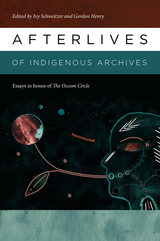
Afterlives of Indigenous Archives
Ivy Schweitzer
Dartmouth College Press, 2019
Afterlives of Indigenous Archives offers a compelling critique of Western archives and their use in the development of “digital humanities.” The essays collected here present the work of an international and interdisciplinary group of indigenous scholars; researchers in the field of indigenous studies and early American studies; and librarians, curators, activists, and storytellers. The contributors examine various digital projects and outline their relevance to the lives and interests of tribal people and communities, along with the transformative power that access to online materials affords. The authors aim to empower native people to re-envision the Western archive as a site of community-based practices for cultural preservation, one that can offer indigenous perspectives and new technological applications for the imaginative reconstruction of the tribal past, the repatriation of the tribal memories, and a powerful vision for an indigenous future. This important and timely collection will appeal to archivists and indigenous studies scholars alike.
[more]
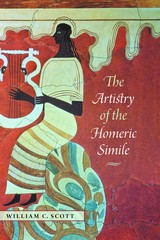
The Artistry of the Homeric Simile
William C. Scott
Dartmouth College Press, 2009
The similes in Homer are treasure troves. They describe scenes of Greek life that are not presented in their simplest form anywhere else: landscapes and seascapes, storms and calm weather, fighting among animals, civic disputes, athletic contests, horse races, community entertainment, women involved in their daily tasks, men running their farms and orchards. These basic paratactic additions to the narrative show how the Greeks found and developed parallels between two scenes—each of which elucidated and interpreted the other—then expressed those scenes in effective poetic language. In The Artistry of the Homeric Simile, Scott explores the variations and modifications that Homer employs in order to make similes blend expressively with the larger context. This engaging study will help unlock the richness of Homer for the modern reader.
[more]
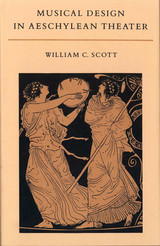
Musical Design in Aeschylean Theater
William C. Scott
Dartmouth College Press, 2000
Musical Design in Aeschylean Theater
[more]
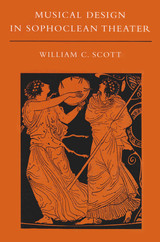
Musical Design in Sophoclean Theater
William C. Scott
Dartmouth College Press, 2000
William C. Scott extends concepts set forth in his Goodwin Award-winning Musical Design in Aeschylean Theater (1984) by examining scansion patterns in the odes of the seven surviving Sophoclean tragedies. Analyzing the play as performed-its full expression in words, music, and dance-Scott finds that Sophocles' metrical patterns are not a secondary detail of the plays but a central feature of their musical organization. Just as the playwright enhanced awareness of themes with a series of recurring and developing verbal images, he also designed the music to guide the audience's understanding of unfolding, often ambiguous events. The fabric of music and meaning is so tightly woven, Scott argues, that significant portions of the plays cannot be fully realized on stage unless the musical effects created by the poet are incorporated. While his work necessarily centers on the chorus, Scott carefully integrates that role into the meaning of the play as a whole, asserting that the chorus becomes a single persona, a character with partial knowledge, limited perspective, and inconsistent responses. The combination of words, meters, and forms provides a new perspective on each play.
[more]

Photography, History, Difference
Tanya Sheehan
Dartmouth College Press, 2014
Over the past decade, historical studies of photography have embraced a variety of cultural and disciplinary approaches to the medium, while shedding light on non-Western, vernacular, and “other” photographic practices outside the Euro-American canon. Photography, History, Difference brings together an international group of scholars to reflect on contemporary efforts to take a different approach to photography and its histories. What are the benefits and challenges of writing a consolidated, global history of photography? How do they compare with those of producing more circumscribed regional or thematic histories? In what ways does the recent emphasis on geographic and national specificity encourage or exclude attention to other forms of difference, such as race, class, gender, and sexuality? Do studies of “other” photographies ultimately necessitate the adoption of nontraditional methodologies, or are there contexts in which such differentiation can be intellectually unproductive and politically suspect? The contributors to the volume explore these and other questions through historical case studies; interpretive surveys of recent historiography, criticism, and museum practices; and creative proposals to rethink the connections between photography, history, and difference. A thought-provoking collection of essays that represents new ways of thinking about photography and its histories. It will appeal to a broad readership among those interested in art history, visual culture, media studies, and social history.
[more]

American Studies as Transnational Practice
Turning toward the Transpacific
Yuan Shu
Dartmouth College Press, 2016
This wide-ranging collection brings together an eclectic group of scholars to reflect upon the transnational configurations of the field of American studies and how these have affected its localizations, epistemological perspectives, ecological imaginaries, and politics of translation. The volume elaborates on the causes of the transnational paradigm shift in American studies and describes the material changes that this new paradigm has effected during the past two decades. The contributors hail from a variety of postcolonial, transoceanic, hemispheric, and post-national positions and sensibilities, enabling them to theorize a “crossroads of cultures” explanation of transnational American studies that moves beyond the multicultural studies model. Offering a rich and rewarding mix of essays and case studies, this collection will satisfy a broad range of students and scholars.
[more]
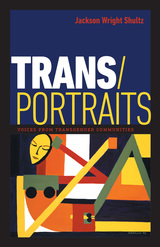
Trans/Portraits
Voices from Transgender Communities
Jackson Wright Shultz
Dartmouth College Press, 2015
Although transgender people are increasingly represented in academic studies and popular culture, they rarely have the opportunity to add their own voices to the conversation. In this remarkable book, Jackson Shultz records the stories of more than thirty Americans who identify as transgender. They range in age from fifteen to seventy-two; come from twenty-five different states and a wide array of racial, religious, and socioeconomic backgrounds; and identify across a vast spectrum of genders and sexualities. Giving voice to a diverse group of individuals, the book raises questions about gender, acceptance, and unconditional love. From historical descriptions of activism to personal stories of discrimination, love, and community, these touching accounts of gender transition shed light on the uncharted territories that lie beyond the gender binary. Despite encounters with familial rejection, drug addiction, and medical malpractice, each account is imbued with optimism and humor, providing a thoughtful look at the daily joys and struggles of transgender life. With an introduction and explanations from the author, this work will appeal to transgender individuals, their significant others, friends, family, and allies; health-care providers, educators, and legal professionals; and anyone questioning their own gender, considering transition, or setting out on their own transition journey.
[more]

Shock and Awe
American Exceptionalism and the Imperatives of the Spectacle in Mark Twain’s A Connecticut Yankee in King Arthur’s Court
William V. Spanos
Dartmouth College Press, 2013
Inspired by the foreign policy entanglements of recent years, William V. Spanos offers a dramatic interpretation of Twain’s classic A Connecticut Yankee in King Arthur’s Court, providing a fresh assessment of American exceptionalism and the place of a global America in the American imaginary. Spanos insists that Twain identifies with his protagonist, particularly in his defining use of the spectacle, and thus with an American exceptionalism that uncannily anticipates the George W. Bush administration’s normalization of the state of exception and the imperial policy of “preemptive war,” unilateral “regime change,” and “shock and awe” tactics. Equally stimulating is Spanos’s thoroughly original ontology of American exceptionalism and imperialism and his tracing of these forces, through a chronological examination of Twain studies and criticism over the past century. As an examination of an overlooked text, and a critical history of American studies from its origins in the nation-oriented Myth and Symbol school of the Cold War era to its present globalizing or transnationalizing perspective, Shock and Awe will appeal to a broad audience of American literature scholars and beyond.
[more]

The Mindful Medical Student
A Psychiatrist’s Guide to Staying Who You Are While Becoming Who You Want to Be
Jeremy Spiegel
Dartmouth College Press, 2009
Four years in medical school are not only demanding and competitive in a strictly academic sense, but they may bring students face-to-face with perfectionism, anxiety, obsessions, power plays, difficult patients, ethical dilemmas, identity crises, sleep deprivation, financial strain, and—perhaps for the first time in their lives—confrontations with disease, suffering, and death. The Mindful Medical Student will broaden readers’ perspectives and cultivate their ability to respond to the extreme emotional, psychological, and spiritual challenges posed by medical school and, eventually, a medical career. Jeremy Spiegel, MD, tackled these issues head on, prevailed, and became a first-rate psychiatrist. Now, in a vital book, he shares what he has learned.
[more]
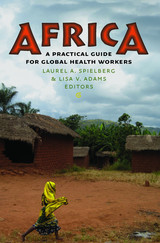
Africa
A Practical Guide for Global Health Workers
Laurel A. Spielberg
Dartmouth College Press, 2011
Written by authors who speak directly from their years of personal and professional experience with health projects in Africa, this book provides an integrated historical, social, political, economic, and health introduction to a series of African countries. It also offers a comprehensive view of major health issues for those aiming to undertake humanitarian and global health work in Africa. In the introductory chapter, the editors discuss the concepts of globalism and humanitarianism, and provide a framework for thinking about global health. They introduce readers to significant aspects of African history and agencies that play major roles in global health work in Africa. The “Tips for Travelers to Africa” chapter provides a wealth of information on preparing for travel to Africa and working successfully and effectively in African cultures. Individual chapters on Botswana, Ghana, The Maghreb, Rwanda, South Africa, Tanzania, and Uganda focus on key health or environmental issues, projects, and solutions unique to each country. Written jointly by U.S. and African medical personnel participating in major health initiatives, the chapters offer vibrant accounts of work on leading causes of disease and death or environmental problems.
[more]
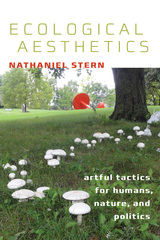
Ecological Aesthetics
artful tactics for humans, nature, and politics
Nathaniel Stern
Dartmouth College Press, 2018
With this poetic and scholarly collection of stories about art, artists, and their materials, Nathaniel Stern argues that ecology, aesthetics, and ethics are inherently entwined, and together act as the cornerstone for all contemporary arts practices. An ecological approach, says Stern, takes account of agents, processes, thoughts, and relations. Humans, matter, concepts, things, not-yet-things, politics, economics, and industry are all actively shaped in, and as, their interrelation. And aesthetics are a style of, and orientation toward, thought—and thus action. Including dozens of color images, this book narrativizes artists and artworks—ranging from print to installation, bio art to community activism—contextualizing and amplifying our experiences and practices of complex systems and forces, our experiences and practices of thought. Stern, an artist himself, writes with an eco-aesthetic that continually unfurls artful tactics that can also be used in everyday existence.
[more]
READERS
Browse our collection.
PUBLISHERS
See BiblioVault's publisher services.
STUDENT SERVICES
Files for college accessibility offices.
UChicago Accessibility Resources
home | accessibility | search | about | contact us
BiblioVault ® 2001 - 2024
The University of Chicago Press


